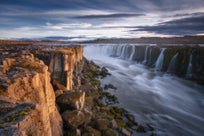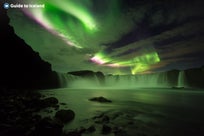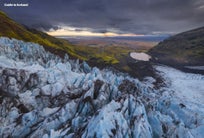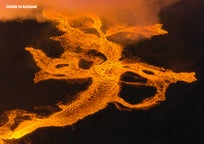
Skiing and Snowboarding in Iceland


Have you ever considered a skiing or snowboarding trip in Iceland? Well, remove those goggles for a moment to read more and discover for yourself the true majesty and excitement waiting on the Icelandic slopes.
Photo above from Exciting 4 Hour Downhill Glacier Skiing Adventure on Snaefellsjokull with Transfer from Gufuskalar
- Explore Iceland's largest selection of Adventure Tours
- Discover Iceland's unbound nature on a Mountain Tour
- Learn all you need to know about the Mountains of Iceland
We have all seen the footage - a snowboarder, perched precariously on top of the world, turning his shoulders, darting at incredible velocity down a vertical wall of white, a thick cloud of powder erupting from beneath him.
Gliding effortlessly, the snowboarder navigates past rocks and trees, other riders, and steep obstacles. His instincts drive him, forcing him through psychological barriers, forever pushing the limits of speed, capability, and adventure. The mountain is his, and he is the mountain - a life on the edge, where only the greatest of natural challenges will suffice.
At first glance, you could be forgiven for believing that Iceland’s ski slopes and resorts lack the excitement of their international counterparts. After all, Iceland is a fairly small country, with only a handful of ski resorts limited to operating from November to May. In truth, however, the skiing and snowboarding culture in Iceland is very much alive and growing, with a fantastic reputation for backcountry carving and ski mountaineering.
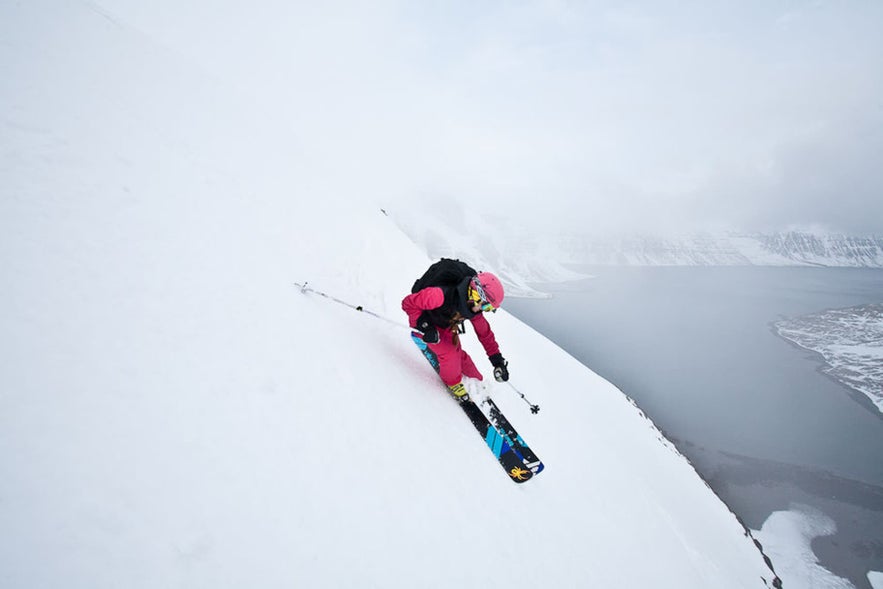 Photo from Exhilarating 6 Day Skiing Tour in Iceland’s Westfjords at the Kviar Ski Lodge
Photo from Exhilarating 6 Day Skiing Tour in Iceland’s Westfjords at the Kviar Ski Lodge
After all, where else can one carve the snow under the waving green elegance of the auroras? Where else is it possible to ride from the mountain top to the shores of the Atlantic Ocean, all in one run? Taking to the snow here could not be more unique, and, given Iceland’s tourism boom, it is hardly surprising to find that this secret is now finally out.
Over the last decade, snowsport organizations such as the IWG (Iceland Winter Games), ISA (Icelandic Ski Association), and Blizzard-Ski have all come together to host numerous competitions and events, such as the AK Extreme Festival in Akureyri. These have further strengthened the island’s reputation as a hub for extreme sports.
Free riders have quickly gotten on board, traveling from far and wide solely to experience the wild majesty of Iceland’s backcountry. Professional riders such as Marcus Caston, McKenna Peterson, Chad Sayers, Forrest Coots, and countless more have traversed the landscape searching for the perfect conditions, conquering mountains like Skessuhorn, “the Icelandic Matterhorn,” and bagging some gnarly footage in the process.
You’ll find all of the details on the best places to experience the rush of flying down a mountainside below.
Ski or Snowboard?
For the experienced ripper, shredder, and mountain person, there is an old idiom when it comes to hitting the slopes for the first time; “skiing is easier to learn, but harder to master - snowboarding is harder to learn, but easier to master.” 'Ski or snowboard?' is the essential first question for beginners, their choice of answer defining their future escapades on the mountain.
Skiing is, by and large, considered the more popular and accessible path, and you can master its fundamentals in a day or two. Skiing's front-facing position gives you an ideal sight-line and a large degree of autonomy for moving your legs. Balance is also considerably easy to pick up, the ski poles acting as both a means to counterweight and propel.
On the other hand, new snowboarders have to grasp an entirely different method for handling their equipment. In snowboarding, the feet are attached to the board, restricting movement entirely. To turn the board, snowboarders must learn the essentials of balancing on the edges of their feet, the toes, and the heel.
They must also learn to use their shoulders for navigation instinctively. Turning the shoulders turns the hips, which turn the body and board. Though it might appear obvious, it's also worth noting that snowboarding requires the rider to be turned forever on their side.
This body position dramatically cuts your peripheral vision, giving you less foreknowledge of what’s coming up ahead. All these aspects take a lot of getting used to and, to begin with, there will be a lot of falling down - don’t be surprised or hurt if a passing skier shouts out “butt-dragger” on their way down. Fear not, they were butt-draggers once too.
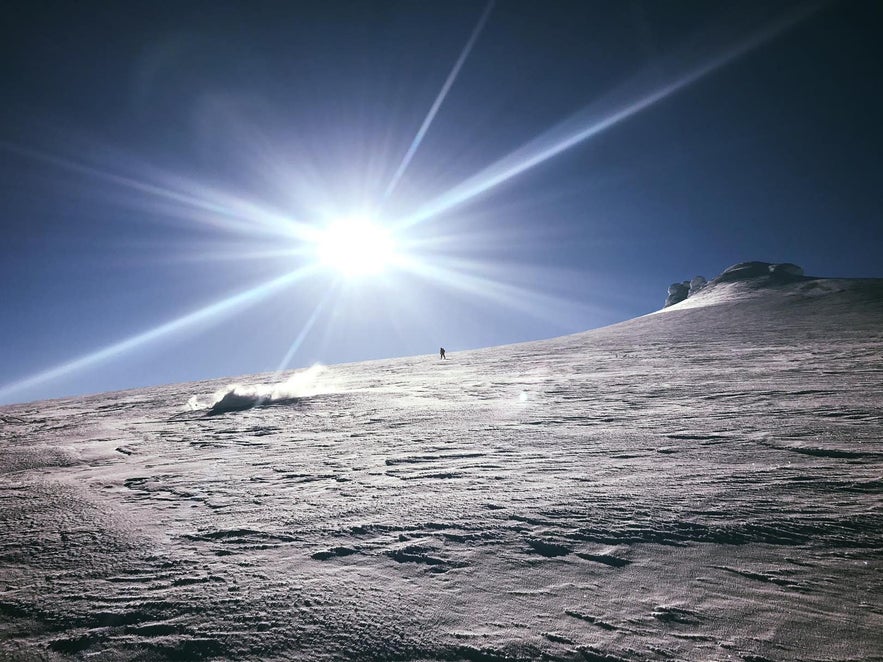 Photo above from Exciting 4 Hour Downhill Glacier Skiing Adventure on Snaefellsjokull with Transfer from Gufuskalar
Photo above from Exciting 4 Hour Downhill Glacier Skiing Adventure on Snaefellsjokull with Transfer from Gufuskalar
Whatever decision one ultimately goes with, skiing and snowboarding instructors are forever on hand to teach the fundamentals of the sport, boost confidence and offer advice on the best way to overcome difficult technical challenges.
Many of the instructors here were born wearing a pair of skis (...painful, I’m sure) and know the terrain and sport like the back of their hand. They also understand how winter sports like skiing and snowboarding present many psychological barriers for the newbie. These are part of the natural learning process, and instructors are adept at taking each beginner as they come. They can also offer excellent advice on rental equipment and nearby accommodation.
A Quick Note on Equipment
Equipment is available and easy to rent at most of Iceland's major resorts, be you a skier or snowboarder. It is highly recommended to at least have a basic awareness of the kit used on the mountainside.
As we’re talking winter sports here, thermal layers are crucial. A base layer of wool or synthetic, worn under a wind and waterproof, soft-shell ski jacket should suffice. Consider a backpack (30-40 liters), thermos, and lip cream (the conditions can be scathing!) Hats, gloves, sunglasses, and waterproof trousers should all go without saying.
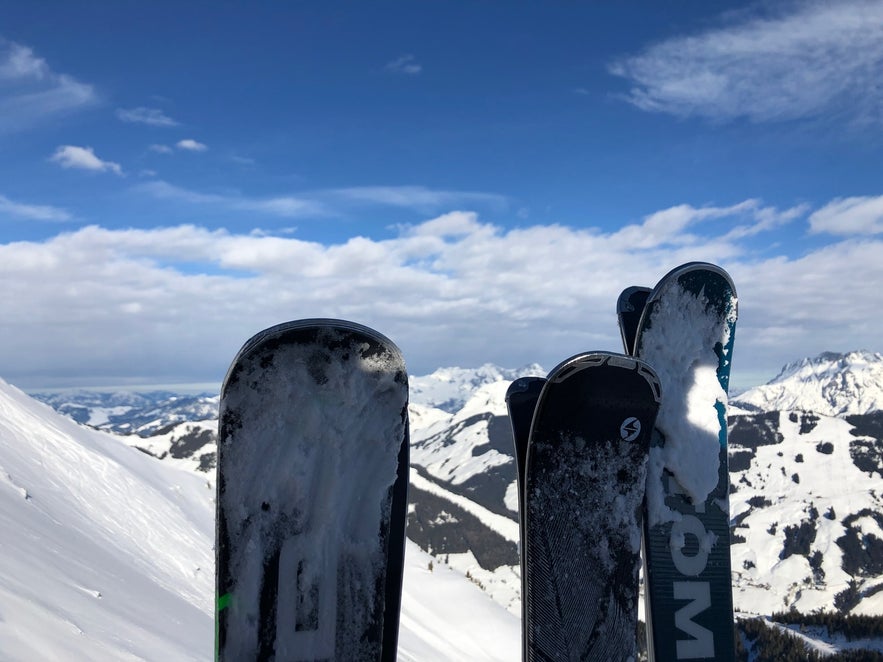 Photo by Bob W
Photo by Bob W
If bringing your equipment into the country, we advise you to keep your ski boots in your carry-on luggage. If you’re planning to traverse the backcountry without local guides, it’s important to first get in possession of an avalanche transceiver, probe, and shovel.
These, in partnership with a first aid kit, could be the difference between life and death on the mountain. As with riding anywhere on the planet, one should always be highly aware of the dangers, be it from the terrain, the conditions, or the sport itself.
Blafjoll Ski Resort
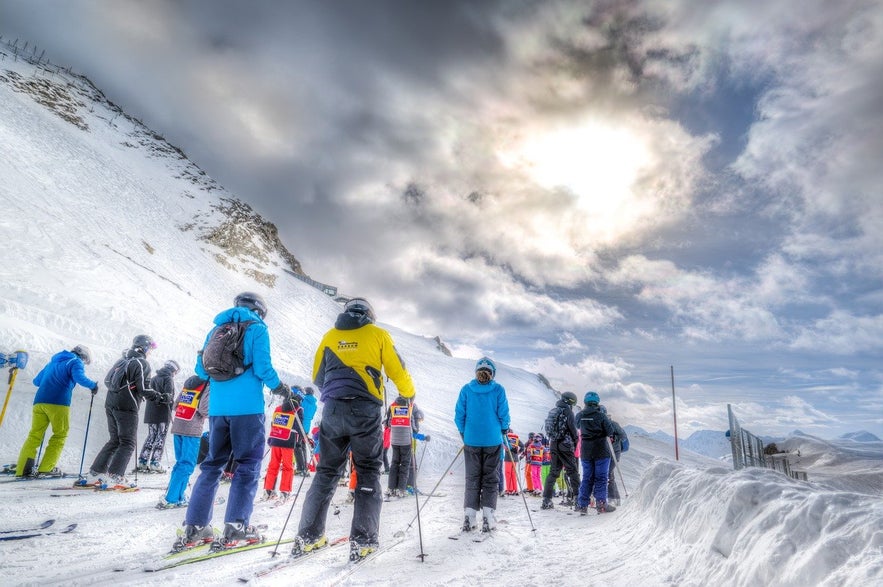 Photo by Skitterphoto
Photo by Skitterphoto
Most visitors to Iceland will make the capital city, Reykjavík, their first port of call. Though skiing in the southwest is generally regarded as less thrilling than in the North, the Bláfjöll Ski Resort still offers plenty for the average skier and snowboarder.
Located just a 30 minutes drive southeast from Reykjavik, this resort is where the city dwellers flock the moment snow begins to lay. Foreign visitors also consider Bláfjöll an excellent choice for an alternative holiday experience, given its ease of access and effortless runs.
The resort holds 16 lifts capable of transporting skiers and snowboarders to a wide array of runs, including off-piste tracks that venture further into the landscape. Floodlighting keeps the slopes well illuminated throughout the season, meaning runs can be undertaken well into the dark, winter evenings, often admiring the Northern Lights from the mountaintops.
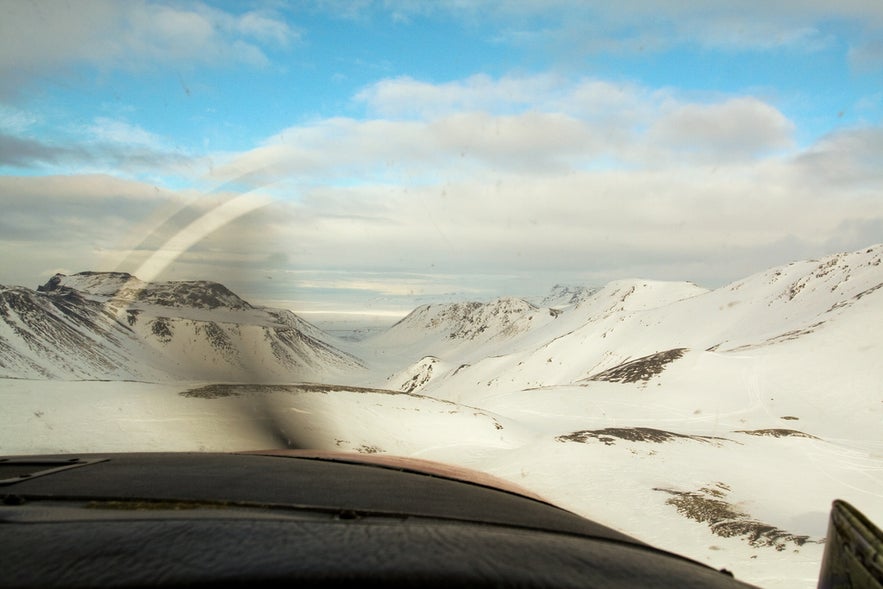 Photo from Wikimedia, Creative Commons, by Herzi Pinki. No edits made.
Photo from Wikimedia, Creative Commons, by Herzi Pinki. No edits made.
As will all ski resorts in Iceland, opening days and times are highly dependent on the weather and snow conditions. Bláfjöll has, in the past, been known to open to the public as early as November.
When open, it generally operates from Monday to Friday from 14:00-21:00, and from 10:00-17:00 during weekends.
From January, riders can expect full days shredding on the mountainside. Just remember that old Icelandic saying… “If you don’t like the weather here, just wait for 5 minutes.” There’s no knowing what those Norse weather Gods are thinking!
Dalvik Ski Resort
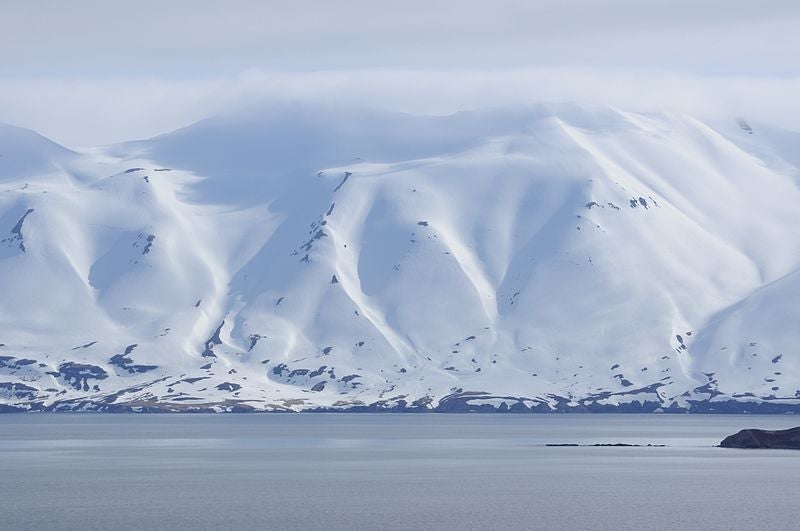
For those riders journeying further into the Icelandic heartland, Dalvík should be the next stop. Dalvík is the unofficial home of skiing and snowboarding in Iceland, with many professional winter sports athletes coming out of this small fishing town, approximately 40 minutes drive outside of Akureyri.
Former residents of Dalvík have competed across the world in such competitions as the Winter Olympics and the World Skiing Championships. It’s hardly surprising, given the rugged terrain of the North and the rich snow that befalls it every year. This terrain is where years of practice means something.
The landscapes around Dalvík - the neighboring Grenivík and the Tröllaskagi peninsula - make it the perfect location for skiers and snowboarders alike. The surrounding mountains brim with opportunities to huck cliffs, ride long powder chutes, and experience off-piste conditions like never before.
For those less willing or able to take to the wild, Dalvík Ski Resort will, weather permitting, often open a backcountry run right next to the resort itself, presenting the chance to experience the backcountry without straying too far from civilization.
At the resort itself, there is plenty to occupy oneself in the meantime. The area boasts a wide variety of runs, more than enough to cover the skill spectrum, with the longest measuring up to 1200m. There are also snow production machines on-site to ensure the best powder season and floodlights that keep the resort well lit into the night.
The names of local snowboarding professionals who, for decades, have made the Northern pow their stomping ground, ring out here like legends; Ásgeir Höskuldsson, Eiríkur Helgason, Halldór Helgason (the younger brother), Gulli Gudmundsson, Viktor Hjartson.
Back in the late nineties, snowboarding in Iceland was a genuinely tiny industry. With a population of just over 300,000, international sporting corporations tended to overlook the small but growing ski and snowboarding culture carving itself into the island’s national identity.
This lack of attention changed over time when local riders' skill and experience could no longer be constrained to the Northern slopes. Their early films as Team Devine - Noxious Dreaming, Why Not? - put Icelandic snowboarding on the map and secured Team Devine’s legacy as the culture's forebearers.
Isafjordur Ski Resort
The ski resort in Ísafjörður is the perfect location for skiers and snowboarders already in the Westfjords. The resort is at Tungudalur, nestled between two gorgeous valleys. There are three chairlifts at the resort and numerous slopes suitable for a wide range of skill levels. The location is situated from 115m to 487m elevation and boasts one of the longest and steepest runs in Iceland.
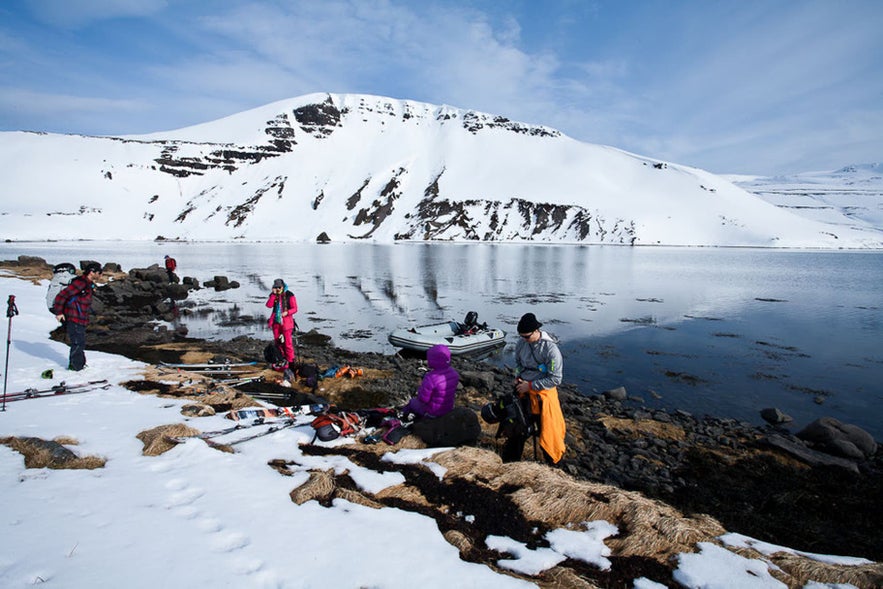 Photo from Exhilarating 6 Day Skiing Tour in Iceland’s Westfjords at the Kviar Ski Lodge
Photo from Exhilarating 6 Day Skiing Tour in Iceland’s Westfjords at the Kviar Ski Lodge
There is also excellent backcountry skiing available from Isafjordur Ski Resort, with the Seljalandsdalur valley holding runs ranging from 2km to 10km.
Regardless of the backcountry or resort slopes, there are truly staggering vistas of the Westfjords from every angle.
Oddsskard Ski Resort
Often referred to as "Iceland’s Eastern Fjord Alps," Oddsskarð is sheltered by mountains around the Oddsskarð pass and road tunnel, positioned bang in the middle between the villages of Eskifjörður and Norðfjörður.
Here, 9km of slopes beckon riders of all skill sets, the largest run peaking at 840m. The resort has three tow lifts capable of transporting up to 2000 people an hour and cross-country runs to suit those looking to ride off the beaten track.
Amenities at Oddsskarð are limited to a single ski lodge, able to hold up to 40 people in sleeping bags, and a cafeteria for those moments of well-earned respite.
Hlidarfjall Ski Resort
A short drive away from Akureyri is Hlíðarfjall, Iceland’s premier ski slope, open from November to May. In 2015, Lonely Planet voted the hill as one of the top 12 exotic ski locations internationally. Locals, however, have always considered Hlíðarfjall the best site for resort skiing. It’s easy to see why.
Hlíðarfjall sits amongst the breathtaking views of Eyjafjörður, a fjord extending to a tabletop summit. Here, the snow is high quality - not too hard, not too deep - embellished by built-in snow blowers that help keep the resort covered in a white blanket all season long. The resort has three tow lifts, with the highest section offering truly death-defying runs - only hit the top if you're an experienced rider!
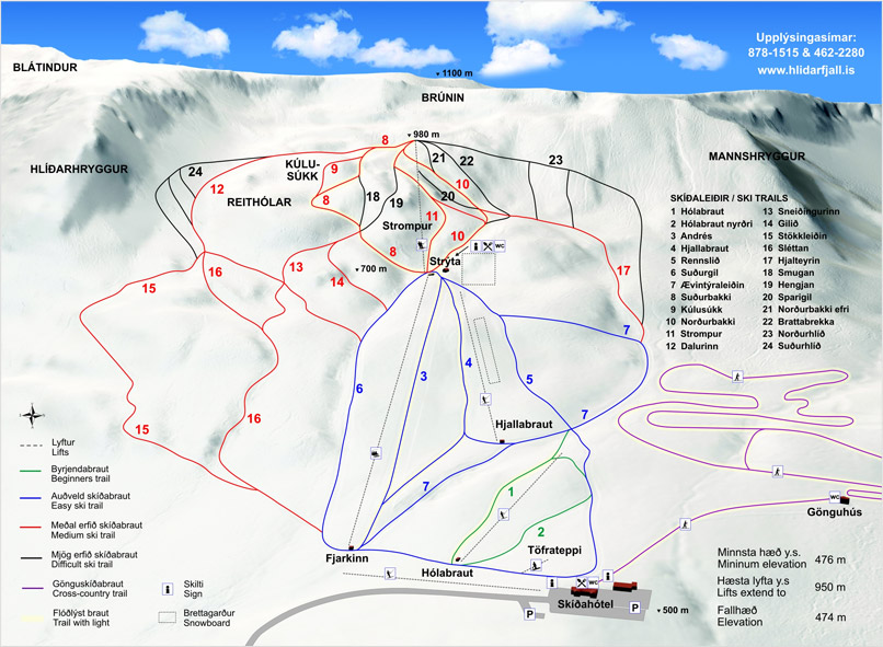
Hlíðarfjall is entirely accessible to both beginners and experienced enthusiasts. Skiing and snowboarding instructors are on hand to help establish the basics of snow sports, with flatter slopes available for those who need the extra time to build up their confidence and skill level.
AK Extreme
For the skiing and snowboarding culture in Iceland, Hlíðarfjall is an important location, hosting numerous events throughout the year. Grandest of all, perhaps, is the AK Extreme Festival, founded by local snowboarder, Sigurður Árni Jósefsson. For four days, Akureyri plays host to skiers and snowboarders from across the planet, engaging them in a range of friendly competitions.
The Eimskip Big Jump, for instance, sees fifteen shipping containers constructed in downtown Akureyri as part of a terrifying snow ramp. Competitors take turns dropping in and catching big air, all in front of 7000 live spectators, a television audience, and a background fireworks display.
If such heights are too disorientating, a specifically built snowpark is close by as part of the Burn Jib Session. “Jibbing” is a term used in skiing and snowboarding when the rider slides across a surface other than snow.
It should come as no surprise then that the snowpark is fitted with a series of rails and jumps. The Burn Jib Session is a fantastic opportunity to check out which riders have truly mastered the skills necessary for urban snow sports. It’s also the perfect time to soak up the lively atmosphere of Akureyri in festival season; expect music, flaming rails, parties, and even some famous faces from the snowsports world.
Back in the slopes, the AK Extreme Festival presents the AK-X Downhill competition, which is essentially a classic race from Hlíðarfjall’s top to the bottom. There are, however, subtle differences that add a unique flavor to the event. Firstly, several randomly positioned poles litter the run. If a rider can snag one and bring it down to the finish line, they will enter a random lottery draw, regardless of their race position.
Secondly, all competitors must carry with them an opened can of Burn energy drink. Rules dictate that the cans will be measured for spillage at the end, adding extra time to the rider’s overall score.
The AK-X Downhill is split into three categories: Teenagers (Beginners/12-15 years old), women (open class), and men (16 years and older). Competitors from each branch have two runs down Hlíðarfjall, two opportunities to show the judges what they’re made of, before finally settling at the bottom for a well-earned BBQ and downtown party.
Trollaskagi "Troll Peninsula"
One cannot mention either skiing or snowboarding in Iceland without the mountainous Tröllaskagi Peninsula quickly cropping up. It is here, deep in the North, where backcountry and ski mountaineering truly comes alive.
Translated to “Troll Peninsula,” there is a long oral history in the region regarding trolls and elves - known in Iceland as ‘the Huldufólk’, or hidden people - a race of naturally interconnected beings who were to thought to habituate the area.
Icelandic MP and scholar, Ólína Þorvarðardóttir, writes of this belief, “The reason is of course perfectly clear. When one's life is conditioned by a landscape dominated by rocks twisted by volcanic action, wind, and water into ferocious and alarming shapes... the imagination fastens on these natural phenomena.”
It is thought tales of the Huldufólk were spread initially, in part, to prevent children from wandering off into the raw Icelandic wilderness. Over time, however, they became a symbol of the purity and the wild character of Iceland's nature.
No wonder then that the Tröllaskagi Peninsula has such rich folklore - the natural landscapes are so unbelievably dramatic and beautiful, not even the threat of trolls can keep skiers and snowboarders from venturing further into the mountains.
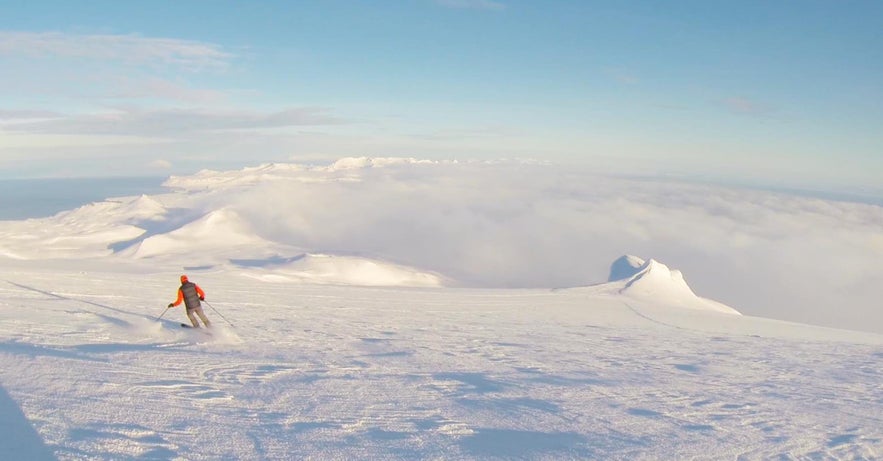 Photo above from Exciting 4 Hour Downhill Glacier Skiing Adventure on Snaefellsjokull with Transfer from Gufuskalar
Photo above from Exciting 4 Hour Downhill Glacier Skiing Adventure on Snaefellsjokull with Transfer from Gufuskalar
The Tröllaskagi Peninsula, covering over 4000 square kilometers, has peaks reaching over 1000m above sea level, the tallest of which is Mt. Kerling (“Old Hag”), standing at an awe-inspiring 1538m.
Situated between the Eyjafjörður and Skagafjörður fjords, there is such an abundance of stunning vistas surrounding the peninsula that forgetting a camera should be considered a criminal offense.
The peninsula itself, formed in the last Ice Age by ancient glaciers, encompasses deep-cut valleys, rivers, and waterfalls, all of which make the perfect location for exploration, mountaineering, and some challenging but highly memorable runs.
Heli-Skiing
The Tröllaskagi Peninsula is, perhaps, best known for heli-skiing. If you were looking for an extreme winter sports experience in Iceland, this is your best bet by far, with thousands of slopes to explore, many of which run down to the Atlantic Ocean!
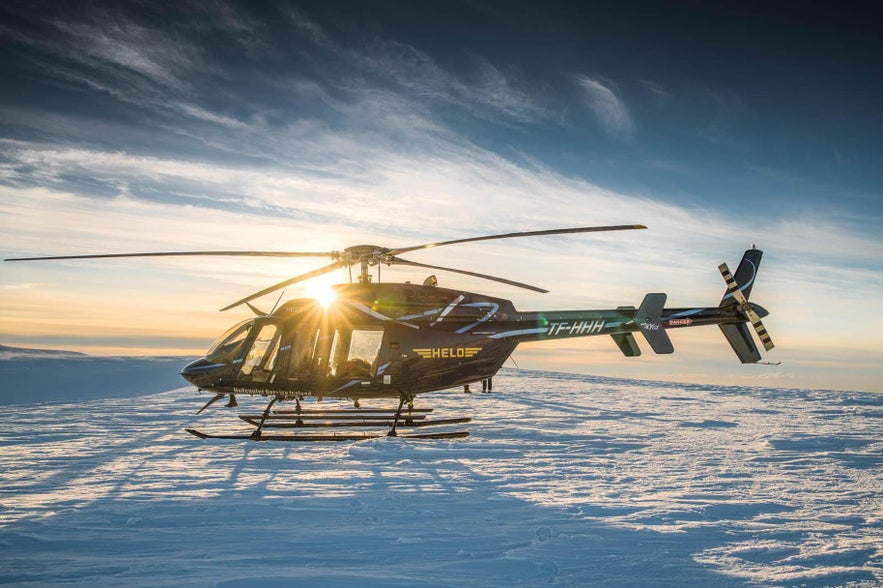 Photo from Thrilling 1.5 Hour Helicopter Tour with a Glacier Landing on Langjokull with Transfer from Reykjavik
Photo from Thrilling 1.5 Hour Helicopter Tour with a Glacier Landing on Langjokull with Transfer from Reykjavik
Tow lifts are traded in for an AS 350 B2 Ecureuil Astar helicopter - the heli-skiing industry's workhorse - and flown by some of the most experienced and skilled pilots on the planet (they are sought after internationally because of their experience and training in notorious Arctic conditions.)
With thousands of logged flights under their belt, it is easy to trust the safe and reliable journey to and from the interior of Tröllaskagi, leaving more headspace to concentrate on shreddin’ that gnar (...snowboarding terms, so I hear.)
With the tours often improvisational in nature, pilots taxi guests from the bottom of the slopes to the peaks, making for a simple and, in many ways, relaxing commute. The adventure doesn’t stop there, of course! Guides, well equipped and knowledgeable of the terrain, will lead their guests across the country searching for the perfect run.
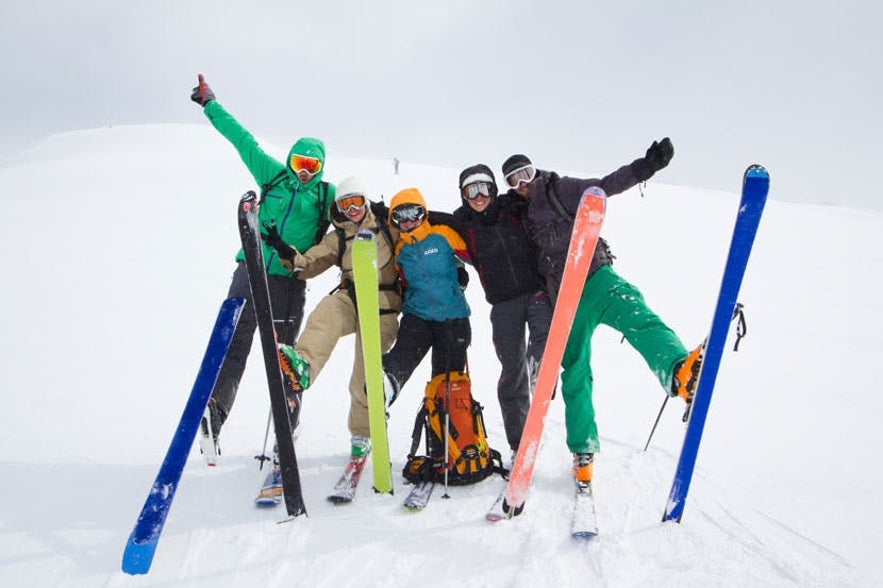 Photo by Aurora Arktika
Photo by Aurora Arktika
There is something truly unique, even magical, about viewing the peninsula from onboard a helicopter. The sheer expanse of the region becomes immediately apparent, with mountainscapes extending over the horizon and beyond. Because of Iceland’s position midway between Europe and North America, heli-skiing here makes for the perfect weekend getaway.
In truth, Iceland offers skiers and snowboarders an entirely new landscape to traverse. With such an incredible expanse of the wilderness yet to be conquered, it’s easy to forget that winter sport here is an exponentially growing and ambitious industry, with ever new challenges permeating the horizon.
Consequently, riders taking to the slopes here have almost endless opportunities to sharpen their skills and experience the country's nature from their own, insider perspective.
더 많은 흥미로운 게시글

아이슬란드의 캠핑 | 꼭 알아야 할 것들
사진 촬영: Pavel Brodsky 광활한 피오르 위로 아침 해가 솟아오르는 장관 속에 잠에서 깨는 건 어떤 기분일까요. 아름다운 산맥 위로 너울거리는 화려한 오로라를 두 눈으로 직접 보는 건 상상하기조차 어려운 경험입니다. 아이슬란드의 경이로운 대자연을 직접 체험하고 싶은 분들께는 캠핑을 추천합니다. 얼음과 불의 땅인 아이슬란드에서 캠핑을 즐기고...더 보기
아이슬란드 여행시 조심해야할 9가지
아이슬란드는 세계에서 손꼽히는 친절하고 안전한 나라입니다. 하지만 이러한 친절함에도 불구하고 친절한 수많은 사람들 중에도 언제나 여행자를 노리는 몇몇의 사기꾼과 약은 사람들이 존재합니다. 아이슬란드 여행 최대 마켓 여행상품 살펴보기 아이슬란드를 자동차로 여행하는 렌트카 여행 패키지 살펴보기 특별하고 가성비 좋은 아이슬란드 코티지 렌트 살...더 보기아이슬란드 렌트카 여행 팁, 여행 & 리뷰
가장 완벽하게 아이슬란드 여행을 즐기기 위해서는 섬 전체를 운전해서 돌아다녀야 합니다. 여기 나오는 1번 국도 근처에 있는 명소들을 여행하면서 들러보세요! 아이슬란드에서 가장 저렴한 렌트카 찾아보기 렌트카 여행 패키지 찾아보기 렌트카 여행 패키지 리뷰 보기 아이슬란드 이해하기 아이슬란드 해안가에는 웨스트피오르드(Westfjords)와...더 보기

아이슬란드 최대의 여행 마켓플레이스를 전화에 다운로드하여 전체 여행을 한 곳에서 관리하세요
전화 카메라로 이 QR 코드를 스캔하고 표시되는 링크를 누르면 아이슬란드 최대의 여행 마켓플레이스를 주머니에 넣을 수 있답니다. 다운로드 링크가 포함된 SMS 또는 이메일을 받으려면 전화번호 또는 이메일 주소를 추가하세요.

